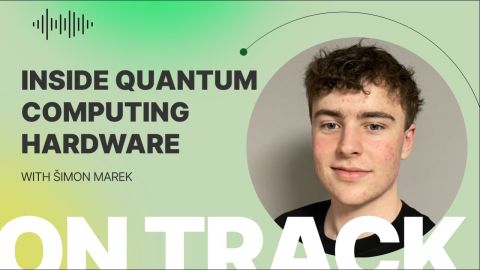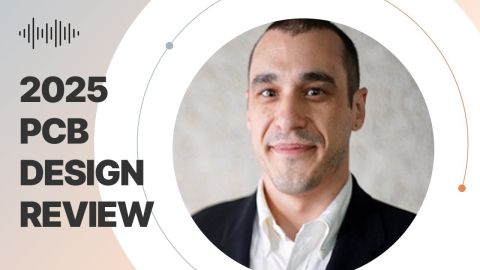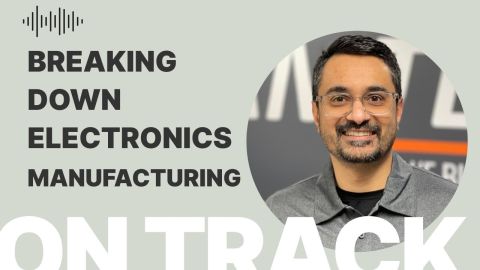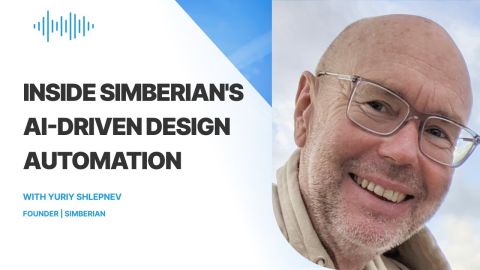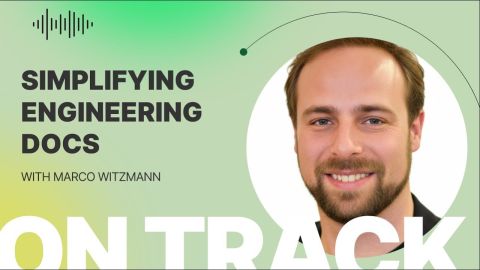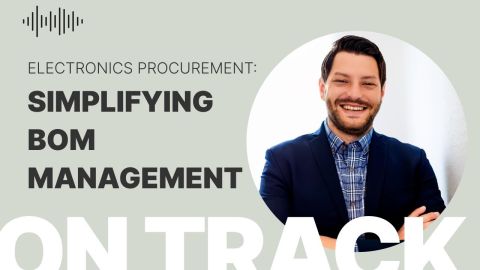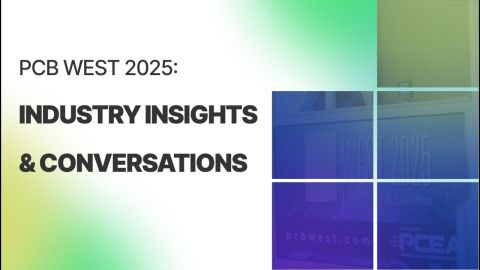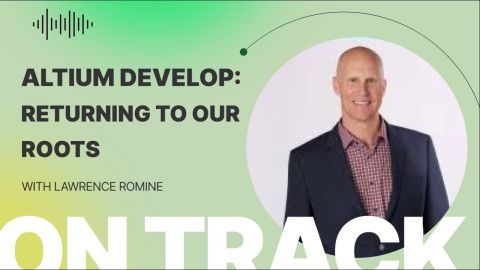Microelectronics Today: Government Subsidies, Education, & Culture

Join us on this episode of the Altium OnTrack Podcast as we sit down with David Schild, Executive Director of the Printed Circuit Board Association of America (PCBAA). In this insightful conversation, David shares the mission of PCBAA, its role in advocating for domestic printed circuit board manufacturers, and the unique challenges and opportunities in the industry.
Discover the fascinating world of printed circuit boards and substrates as David talks about the diverse members of PCBAA, ranging from woven glass producers to drilling equipment manufacturers. Get a glimpse into the innovative world of PCBAA through David's discussion of the association's impactful business cards and the importance of physical materials in conveying industry priorities. He also sheds light on the role of automation in manufacturing facilities and the vital connection between education, advocacy, and legislation in shaping the future of the electronics industry.
Whether you're a seasoned professional or just curious about the world of printed circuit boards, this podcast provides valuable insights into the heartbeat of modern electronics. Tune in to learn more about the industry's past, present, and the exciting possibilities that lie ahead.
Listen to the Episode
Watch the Episode
Show Highlights
- Intro
- What David Does for PCBAA
- David's Background
- What Should the US Market Share in Microelectronics Manufacturing Be?
- Government Subsidies & a Race to the Bottom
- What Role Does Automation Play in Price Competition?
- Encouraging Young People to Get Into the Industry
- Electronics & Popular Awareness
- Is the Messaging Getting Through?
- How to Educate the Masses about Microelectronics
- PCB-7?
- It's Going to Take Time
- Impressions about PCB West
- Increased Visibility at Trade Shows
- Learn More about PCEA & PCBAA
Links and Resources
- Watch related episodes:
-
Read related articles:
-
Connect with David Schild on LinkedIn
Transcript
Zach Peterson:
Okay, so I think that's a fair way to address the criticism around subsidies. So however, if you do get into a situation where maybe one nation wants to be just hitting everybody with a sledgehammer of subsidies, how does everyone else compete if it's not also with subsidies, it would seem that there's a few different things that they have at their disposal. One is geographic diversification, so we're lower risk, but what role is technology and automation going to play in enabling people to, or enabling companies to maybe compete on price without having to rely on subsidies?
David Schild:
I think automation has to be part of the story. If you look at the new Schweitzer facility that's been built in Idaho, if you look at is zola's new facility that's doing laminate in chamber, Arizona, you'll see that those are highly automated facilities. They look very different and they feel very different from some of the legacy plants that are available in that space. Part of this, of course, is driven by the economics, but the workforce challenges are also very real, right? We simply don't have a talent pipeline. You're seeing this with semiconductors now. We're trying to solve for this immediate problem of stopping the bleeding and basically saying, look, we need to maintain a healthy industrial base when it comes to printed circuit boards and substrates. The longer term challenge, Zach, is absolutely the workforce challenge. How do we make sure there's a pipeline of people to work in these facilities regardless of how many people it takes to run them, right? Efficiencies from automation are going to happen and you may not need the same size workforce that you needed before, but these are high touch labor jobs. They're highly skilled jobs, and currently we have to use programs like the H one B Visa program to get a lot of the workers that we need. So I do think it's important that we look out into the future and say, short-term investment now, how does it create a sustainable industry, not just for years, but for decades.
Zach Peterson:
Hello everyone and welcome to the Altium OnTrack podcast. I'm very happy to be joined today by David Schild, executive director of the Printed Circuit Board Association of America. I had the pleasure of catching up with David at PCB West recently, and I thought it would be great to bring him onto the podcast to talk about what P-C-B-A-A is doing. David, thanks so much for joining us today.
David Schild:
Great to be here, Zach. It was good seeing you in Santa Clara.
Zach Peterson:
Yeah, and you had these really awesome printed circuit board business cards. So for those watching on YouTube, check this out. If you're listening on audio, go check out YouTube so you can see this. It's pretty cool and you're forcing me to step up my game a little bit. I'm going to have to get some of these.
David Schild:
Well, I credit our president Will Marsh for creating those cards. It was pretty inspired. It precedes actually my time with the association, but boy, I have handed out probably thousands of them in the time since we were founded in 2021, and yeah, it's very cool to be able to put into the hands of the people you're talking to your audience. A piece of physical material actually reflects your industry and your priorities, right? I come out of a world of advocating for radars and all kinds of space systems, and of course you can't put a satellite in the palm of your hand, so this is pretty cool.
Zach Peterson:
Well, if this were a component in this satellite, I think it would make it just that much more real for anyone you're talking to.
David Schild:
You know what, and I'm glad you said that because it absolutely is, right. None of this stuff works without modern micro electronics, and that's one of the things that we remind people of when we go to Capitol Hill.
Zach Peterson:
So if you could, for folks in the audience who are not familiar with PCB aa, maybe tell us what you do for the organization. We've had Travis Kelly on in the past and he's given us a good overview, so maybe tell us what you do.
David Schild:
Sure. So I'm PCB a's executive director and the Printed Circuit Board Association of America was founded in 2021. Our mission is to educate, advocate and legislate on behalf of domestic printed circuit board and substrate manufacturers as well as their critical material suppliers. And so if you look across our 42 members, you'll see a diversity of people who make woven glass, people who make drilling equipment, people who are into plating and special chemicals, and of course board manufacturers, board shops, et cetera. I am very lucky to lead the organization here starting in 2022 and now into 23. I guess I'm coming up on a year in this gig and it's been really educational for me, but it also has allowed our volunteer leadership, our president, our chairman, our board of directors to focus on their day job, which is running printed circuit board companies. And I think we realized as we got bigger and we grew that we needed something closer to a full-time staff. And I'm really proud of our team that focuses on advocacy, that focuses on communication compliance, of course, all the back office work of doing member services times 42 members and growing, and it's a really neat and unique opportunity for me.
Zach Peterson:
So I have to ask because us talking electronics today, is your background in engineering or in electronics? How did
David Schild:
You get
Zach Peterson:
Done with all this?
David Schild:
You want to keep me as far from the soldering iron as possible that is in everybody's best interest. I'm a user of things that run on modern micro electronics, but I couldn't break open a board and you really tell you very much how it needs to come together. A little bit of knowledge is dangerous as they say. No. My background is in technology advocacy and communications work in corporations like United Technologies, Raytheon, TRW, and it was through those jobs that I got exposed to the microelectronics industry. You can imagine that major defense and aerospace primes are tremendous consumers of microelectronics and they're doing a lot of business with the summit interconnects, the TTMs, the Calumets of the world. And so that's how I first got exposure to the association when they launched and I was in a period of my life when I was looking for a new opportunity and they said, Hey, why don't you come work with us on this project?
(05:52):
I liked it because it was all about American manufacturing at a time when American manufacturing really had the wind at its back, and I think it still does. It is this intersection of economic security and national security, which I really like, and as I've told people, it's much easier to be on the offense in Washington. I don't have to apologize for anything the industry's doing. I don't have to backpedal, I don't sort of have to cover for what we already have. I am here to take those numbers back to where I think they should be and back to where a sustainable and healthy industry can be. Right? In 2000, we had 2200 board companies in America. Today we have less than 150 and part of my job, part of my mandate is to get us back to that place. And so my experience explaining high technology to lawmakers and policymakers, building coalitions and doing sort of the grassroots government relations, communications, advocacy work necessary to advance those goals. I think that's sort of what brought me to this moment.
Zach Peterson:
So you mentioned just a moment ago, which I think is very important, that you want to see the industry grow, at least in the US back to a higher number of shops or higher market share, whatever the case may be. I've asked this question I'm going to ask you in just a moment. I've asked this question to Travis and I've posed this question to Representative Blake Moore when we had him on the podcast, and that question is what is the objectively right number? Because when you go from 50% to 4%, the broader market seems to think that 4% is the appropriate number, and I'm sure we have to meet in the middle somewhere. So what should the US market share be and is it really going to be something that's delineated by different technologies, different industries? What do you think about this?
David Schild:
This is a great question and it's a question that I've been asked on Capitol Hill at the White House at the Department of Commerce and the Department of Defense. I think many people say, okay, we've established that there's a problem. What does the solution look like? And I can't pick a number. What I would say is two things. First, we need a sustainable industry. We need an industry that on its own is going to be able to persevere and be here for the next 10, 20, 30 years as we sort of invent and manufacture the future. That's not an industry that is sort of facing really, really tough foreign competition. It's not an industry where the commercial side of the house is not healthy enough to support the defense and aerospace side of the house. But Zach, one thing I might take issue with that you said is that this is all driven by the marketplace.
(08:20):
We talk in the United States these days about economic policy and some people use the term putting our fingers on the scale or government intervention, industrial policy is somehow picking winners and losers. I could not disagree with that more strongly. I think we are playing catch up on industrial policy. So people talk about offshoring being driven purely by market forces. Yes, for 30 to 40 years now, the low cost of manufacturing overseas, globalization, international trade agreements have certainly made it attractive to do some manufacturing overseas. Consolidation led to that. A lot of what we do being represented by public trade companies and of course priorities as a result of that. But here's what I would say as well. Other countries decided that they wanted to own microelectronics. Other parts of the world decided that they wanted to lead in this space and what that led to on the ground in Asia in places like China specifically was subsidized housing or free housing for workforce construction of factories at no cost to the folks who would be running them.
(09:20):
There's a huge research and development tax credit that goes on in many parts of Asia that we don't get to apply here in the United States. So what I think is that market forces combined with political and economic decisions by foreign governments is what really sort of hollowed out the industry and sort of led us to the place we are now. And when we talk about the CHIPS Act or when we talk about getting involved with the PCBs Act, which is our legislation, I think we're playing catch up. I don't think that we are doing industrial policy and other companies are doing pure capitalism. I think that nation states always have had an interest in favoring in backing and investing in their people and their industries. We're doing it now, but again, flashback to 1992, 2002 other nations were doing it and we weren't sort of aware of the road we were going down.
Zach Peterson:
Well, obviously subsidies by other nations across the globe plays a real important role in this. As you just brought up, whether it's a direct subsidy or whether it's a tax credit or whether it's money for research and development, are you concerned that this eventually creates a race to the bottom for subsidies and subsidizing certain industries or certain companies? I bring this up because I recently read on LinkedIn that there was a link to a news article that mentioned that Chinese EV makers are losing 35 K per vehicle and they're being of course backstop by the local government or by the national government. And it seems that when subsidies come into play, it really does become an issue where you do have a race to the bottom because whoever subsidizes the most is going to allow that nation or that company to then really compete on price.
David Schild:
Yeah, I think we need to be careful that we don't, especially with our allies in places like Europe and Canada and Mexico, create a situation where the incentives are so extreme that as you said, creates a race to the bottom. I don't see that happening right now. I think the United States is simply playing catch up with most of Asia and specifically China because I think that that's where 56% of board production is going on right now is mainly in China. I also think that there will be a portfolio of work around the world. I have not heard anybody who's a domestic manufacturer say, I think we're going to own this. I think we're going to have all the work outright. In fact, what I've heard is there's going to be some work in Mexico, there's going to be some work in Canada, there's going to be some work in Malaysia, in the Philippines, in Taiwan, in Vietnam, in China for sure.
(11:59):
And that a balanced portfolio is a sustainable portfolio. I actually think, Zach, that post pandemic, there's an economic value to sustainable and resilient supply chains. You hear people talking about decoupling, but the other phrase you hear a lot is de-risking. You hear de-risking because supply chain managers heads of purchasing are saying, I will face another crisis. I know it's coming. Maybe it's not covid, it'll be something else. It'll be manmade, it'll be a natural disaster, but another crisis is coming and I simply can't have empty store shelves. I can't have empty parking lots, I can't have interruptions in my just-in-time delivery. And so what I want to do is have multiple sources of what I need. I want to have multiple locations, I want to have multiple vendors, and that comes back to the bottom line. It's being priced into the market. So I think companies all over the world are going to say we want to source in a variety of locations and it's going to be built into our pricing and it's going to be built into our forecasting, but I'm not concerned that this will get out of hand.
(13:00):
I think we have to re-level first and then see what each nation wants to do. You I'm sure have watched the Chinese government implemented its own chips act, the Spanish government, its own chips act. There's talks in France in the UK about similar programs to incentivize semiconductor manufacturing. Everyone's trying to get in on the act, and at some point you saw this with domestic manufacturing in other industries in the United States. How did the auto industry move out of the Midwest and into the western states and the south? It was through a lot of incentives and at some point that sort of leveled out. And of course now we're doing work in Ohio and we're also doing work in South Carolina and we're also doing work in Arizona and we're doing work in Mexico. I think you could say there's a balanced portfolio in the auto industry. Not everyone's happy with it, but it is not a balanced portfolio right now in microelectronics.
Zach Peterson:
Okay, so I think that's a fair way to address the criticism around subsidies. So however, if you do get into a situation where maybe one nation wants to be just hitting everybody with a sledgehammer of subsidies, how does everyone else compete if it's not also with subsidies? It would seem that there's a few different things that they have at their disposal. One is geographic diversification, so we're lower risk, but what role is technology and automation going to play in enabling people to or enabling companies to maybe compete on price without having to rely on subsidies?
David Schild:
I think automation has to be part of the story. If you look at the new Schweitzer facility that's been built in Idaho, if you look at is zola's new facility that's doing laminate in chamber, Arizona, you'll see that those are highly automated facilities. They look very different and they feel very different from some of the legacy plants that are available in that space. Part of this, of course, is driven by the economics, but the workforce challenges are also very real, right? We simply don't have a talent pipeline. You're seeing this with semiconductors now. We're trying to solve for this immediate problem of stopping the bleeding and basically saying, look, we need to maintain a healthy industrial base when it comes to printed circuit boards and substrates. The longer term challenge, Zach, is absolutely the workforce challenge. How do we make sure there's a pipeline of people to work in these facilities regardless of how many people it takes to run them, right? Efficiencies from automation are going to happen, and you may not need the same size workforce that you needed before, but these are high touch labor jobs. They're highly skilled jobs, and currently we have to use programs like the H one B Visa program to get a lot of the workers that we need. So I do think it's important that we look out into the future and say, short-term investment now, how does it create a sustainable industry, not just for years, but for decades?
Zach Peterson:
Do you think that the workforce situation can be changed more at the local scale once a lot of these plants really start to see signs of life and once some of this legislation really goes into effect, whether it's in the US or in Europe, I don't know that there can necessarily be a national workforce development program that's going to work everywhere, but maybe if local governments get involved and help encourage young people to get into these areas as a career, whether it's semiconductors or printed circuit boards, do you think that's going to be a viable approach to get kids to care about this stuff? Again,
David Schild:
One thing that I've been really impressed by is the role of our universities and the institutions of higher learning. Of course, we cannot start when people are 19 years old and say, it's time to learn about microelectronics from zero. We do need STEM and steam programs at the elementary school and the high school level. We've got to get kids interested in these fields early on. Of course, a healthy base of math and science underpins that. But when I see Ohio State University at the Intel groundbreaking event in Columbus, Ohio, when I see Arizona and Arizona State University present for the facilities that are going up around the Phoenix area and throughout the state of Arizona, I'm encouraged because I think universities which are having their own sort of moment of are we delivering value and how do we stay sustainable? And as fewer, fewer people are in that demographic curve going to college, how do we offer a value proposition?
(16:55):
One of the ways you do that is to say, Hey, electronics, manufacturing, microelectronics specialties, that's a career. Look at our industry. People have been doing this for 30 or 40 years. It is a career. You can have a full job journey inside this space, but right now we can't meet the demand signal with the number of kids coming out of undergraduate and graduate programs. So I'm encouraged that universities look across the highway, across the field, right across the city and say, new factory going up. Can we supply the workforce? I don't think the schools I mentioned are going to be the last ones. You're starting to see some interest in Georgia. You're starting to see some interest in New York and California. If I was a provost or a dean right now, I'd be thinking pretty hard about how strong is my computer science program? How strong is my electrical engineering program? How many kids am I going to be kicking out the door to go work at the Amphenol, the Rogers, the sand mean of the world?
Zach Peterson:
Well, I think computer science and computer engineering has been pretty healthy over the past 20 years or so. But I mean it's all gone into it and software, and it's not that they don't deserve to have talent, but we need some talent too.
David Schild:
Yeah, I think you're absolutely right and if you meet the men and women who are doing this kind of stuff, and I've been fortunate to go through a bunch of these plans, it's very impressive, and yet at the same time, it's an older workforce and we need to be able to replace those folks because they're not going to be there forever and it is not possible to grow without this problem being addressed. And you do hear it already from the semiconductor folks, Hey, the money to put the facility up is great. The money to buy the tooling is great. We're pouring concrete, right? We're hanging ceiling lights, but who's going to work here? That is not an easy problem. It's not a problem the PCB and substitute industries are going to solve on their own. I think everybody in manufacturing writ large has to want to tackle this problem.
Zach Peterson:
I almost think there's a pop culture element here too, because when you listen to the news and people in the media, when they say technology, what are they referring to? They're referring to Google and they're referring to Facebook and Netflix and that kind of stuff, and it all lives on the back of electronics. But when they, for example, look at the PCBA business card, they don't think of that as being something that's really heavily engineered. And if it's not built correctly, none of that other stuff works.
David Schild:
I'm so glad you said this because it so echoes what we're doing on Capitol Hill every day we go in and we point to a javelin missile really in the news lately, and we say, Hey, I'm sure you understand that this thing is pretty dumb without a printed circuit board microelectronics on board. Or we point to a constellation of satellites and say the internet that this is making possible. For example, obviously we need high-end microelectronics that operate in dynamic environments to make that possible and people kind of nod their head, but then I point to the dishwasher or I point to the ceiling light or I point to the wristwatch and I go, you're equally dependent on microelectronics for all of that pacemakers, banking servers, electrical, electric vehicle chargers, windmills. Is there anything right now that has electricity running through it that doesn't require boards and substrates and semiconductors? I mean that three part stack is everywhere. It's everywhere. And we've got to get people out of thinking about their phones and their laptops as the interface they have with microelectronics, and we have to start saying, no. It's pretty much everything that's carrying electricity now has that three-part stack. So your dependency is actually very widespread. It's actually very deep because I don't want to live without my phone, but I don't want to live without my coffee maker. I don't want to live without my thermostat.
Zach Peterson:
Is this messaging really hitting with people on Capitol Hill and I guess if you look overseas in the UK or Japan or anywhere else that's developing industrial policies around electronics, is that same messaging hitting with them as well?
David Schild:
I think that the Covid 19 pandemic absolutely focused lawmakers on supply chain security and resiliency. Certainly like nothing we've seen in our lifetimes, I don't think the CHIPS Act gets done without the fact that you're waiting on trucks at the Port of Long Beach waiting on semiconductors. I don't think so. I think you have to have a sense of urgency. It took about 44 months by my count to get the chip sack from ideation to execution signature on the president's desk, and by some estimates it may take another 10 years to get the money out the door. My own view is that the educate part of our educate, advocate and legislate mission is the most important part. I know many of your listeners are working inside of the electronics industry right now. Maybe they're in assembly, maybe they're in tests, maybe they're in manufacturing, maybe they're in raw materials, whatever it might be, and that's their life.
(21:37):
That's their livelihood. That's how they're going to send their kids to college. It's what they built their career on. But you have to step back and imagine that a member of Congress, a member of the current administration knows a little bit about this issue because every day someone comes into that office and says, I'm here on behalf of corn growers. I'm here on behalf of the Boy Scouts. I'm here on behalf of pharmaceutical companies. And that's every single day in Washington a competition for your attention. And our friends at Intel and TSMC and Micron really captured the attention of lawmakers for an extended period of time and we have to do the same thing. So if I'm being honest, I've gone into a lot of offices and I've held up that card or I've pointed to something in the office and said, it runs on PCBs, it runs on substrates, and it's like a light bulb's going off, right?
(22:20):
A light bulb probably running on PCBs as well. People don't know that. So we have a solve for the, I didn't know. I was dependent on this problem first. Then we start getting into the economics. Did you know that we used to have 2200 board shops? Did you know that we invented this here? Did you know that over three decades we largely offshore it? The answer to that question is often, I did not know that. And so what I would say to your listeners and people at home is just because you work in this industry, just because your community understands the importance of that facility, that doesn't necessarily translate into political power in Washington. That's why we were formed. We were formed because the industry needed a voice in dc.
Zach Peterson:
So I'm really glad to hear that the messaging is hitting with people in Washington, and I'm hoping that the same kind of messaging can somehow get out to the broader public and I don't know what it takes. This is something that I think we struggle with just in the design community as far as getting new people interested in design and understanding the impact of design and people that are interested in PCB design generally are already kind of technical. I could imagine it's even more difficult with someone who maybe has a background in law and now they're working on Capitol Hill, and how do you get the message through to them?
David Schild:
It's a great question. Again, we this educate, advocate, legislate mission, and it is not limited to lawmakers. What I would say is we have a couple of things going on right now. You're seeing all across the country a series of opinion pieces that are co-authored by my chairman Travis Kelly and local leaders, folks like Kurt Whitcomb from Amphenol, Roger Tush, ham from Rogers Corporation. You've seen these op-eds run in regional papers all over the country talking about how the CHIPS act was a great start, but we need to go further with microelectronics like boards and substrates. So we're trying to reach a broad audience. We've got a video series that we push on social media called PCBs, make it possible talking about how printed circuit boards are at the heart of medical devices, automotive technology, telecommunications, et cetera. And I think you're also seeing just an increased footprint by the industry.
(24:32):
Certainly, we're north of 3000 followers now on social media, and we had zero in November of 2021. So pretty strong growth in terms of our ability to get the word out, and I think it only gets bigger as our membership grows. I think I mentioned we started with five companies in 2021. We just passed 42 last week I think on our way to 50 plus members. And those individual companies do a great job of getting in the word out all over the country, whether it's the upper peninsula of Michigan or rural South Carolina or the suburbs of Chicago where a lot of this manufacturing goes on. But you're right, I don't think we're still at a place where the average American really understands that facility that they drive by. Let's say it's Aurora circuits right there in my hometown outside Chicago. I don't think they really understand the implications of what's going on in there, how critical that technology is to their everyday lives. We're going to go after that problem. I'm of course starting with policymakers and lawmakers because they can affect the change that is so important for our industry. But if as part of that broader effort, the average American, I would call them the voting American picks up a newspaper or goes on to a social media link and says, huh, PCB substrates, that's really interesting. I think that's a nice side benefit as well.
Zach Peterson:
I would agree. I think one thing that is interesting to ponder is essentially what happened after the CHIPS Act passed, there was talk about forming the chips for legislation, and there have been other partnerships between different nations and just recently Carissa NIE from the Center for New American Security, she was arguing for an organization of semiconductor producing nations called Semi seven. And I think if you follow that logically down to PCBs and you start to have these industrial policies come along focused on PCBs and electronics manufacturing, you then have to wonder, are we going to have a PCB seven?
David Schild:
I would be thrilled to see a rebalancing of the global portfolio. Of course, I lead an organization focused on American manufacturing. We invented this technology here. I think we're doing the highest in boards anywhere in the world here in the United States, but none of us are trying to undo the global order. None of us are trying to deconstruct a global economy. And so I talked to people in Mexico, I talked to people in Canada, I talked to people in Switzerland and Germany, and they want in on this and their governments are acting accordingly. We're all sort of at the same place in terms of we are dependent right now on one region and one country for way too much of this work. So when you talk about alliances, I mean this really is also the intersection of course of national security and economic policy. When we talk about who are the countries where we have security alliances and do we look into those manufacturing supply chains and say in some cases what we have to do is make sure that those defense and national security alliances become economic alliances as well. And any number of our members, our global operators, they are spread out all over the world. We are not just companies who are exclusively here in the United States. So yeah, I think a rebalanced portfolio brings in our friends in Europe and our friends in North America and probably South America and of course parts of Asia where national security alliances are very strong as well. So that's the end state, but the present state is risky and problematic.
Zach Peterson:
Getting to that end state takes a while. There's already broadening out into Vietnam and India. I know the iPhone I think is being assembled or produced in India. You always see in the news they're having some kind of quality issue and as Apple stock takes a hit for the day, that kind of thing. But I think it's going to take a while to really see all of this start to proliferate out and maybe get a more balanced production portfolio. Would you agree?
David Schild:
I would tell people all the time that we took 30 plus years to dig this hole and we're not going to dig ourself out of it in 30 weeks, maybe not even 30 months. It's going to take a while for us to get there. But the imperative is to start, Zach. It's not to watch this happen any further. We've recognized that there's a problem. We're educating people as to the nature of the problem and the solution and what follows is action. What has to follow is action.
Zach Peterson:
Yeah, I would totally agree. So let's take this back full circle. Come back to PCB West. It was your first time at P CCB West. I didn't know you were going to be there, but of course I walk by and it's like, oh, hey, it's David. So that's kind of how PCB West is. You're walking through the aisles and then you see someone you haven't seen in the few years, and then of course you strike up a conversation. So it was great to see you there and it was great to see so many other companies there. What was your impression of the show?
David Schild:
I'm so glad that I finally got to one of these. I've been helping the team at PCBA out for a couple of years, and we knew that a trade show presence was important. I'm looking forward to P CCB East next year, possibly some participation at the Apex Show. I know the surface mount folks are interested in talking to us as well. I think we need to go where the industry is. And that's the reason you saw me in Santa Clara. I was amazed not just to see our existing members, but also folks who I think should be on our team who had never heard of us. I mean, the word is out, but it's a word that we've only been pushing for 28 months or so. And so I met a lot of folks in this industry who for the first time we're like, oh, chips don't float. That's you guys. Educate, advocate, legislate, that's you guys. And it was really fascinating first to see sort of the technological innovation that's happening in this space and the way people are moving into ultra high density ink interconnects and the next generation of substrates and boards, the automation that you were talking about. All that stuff is really educational for me. But the important thing is meeting the men and women who do the work and honestly the people for whom we are working in Washington.
(30:27):
It could be a little detached sometimes to see a LinkedIn post or to see me on a podcast and say, oh, okay, well these guys guys are active in dc. There's another beltway bandit. But the reality is that I was able to walk from booth to booth and hand out materials and say, look, you're building this stuff. In many cases, you're second or third generation American building this stuff, your father, your mother, your grandmother, they did this kind of work. You want it to survive. That's my job is to give you some help in dc That's the association's mission to represent you in Washington where policy gets made. And as soon as I say, Hey, wouldn't you like to have for our industry what the CHIPS act did for semiconductors? Yeah, people's eyes line up and they go, well, of course I'd love that. That's great.
(31:13):
How do I do that? And the first step is, okay, get on the team. Let's go forward. As a large organization, I say this all the time, the larger the political footprint, the greater the political power. Every time a new member comes on board, we get a new facility, we get a new footprint, we get a new part of a local economy somewhere. It doesn't matter if it's New York's 22nd district or California's 50th district, wherever it might be. Boy do lawmakers start paying attention when you point to jobs and real estate and taxes and careers and contributions to pretty much every part of the economy. That's where microelectronics ends up. All of a sudden those lawmakers want to take a meeting, right? Want to hear you want to come talk to your group? So every member is a more political power in Washington.
Zach Peterson:
So it sounds like the response from folks that you were talking to on the show floor was very positive.
David Schild:
Yeah, I would say
Zach Peterson:
You didn't get much criticism or anything.
David Schild:
No, of course. It's a global show and there are people there from all over the world, and I think I got a few winks and nods from folks who may be arriving overseas. But look, we don't bury our head in the sand. I talk about a global economy all the time. Our leadership talks about a global economy all the time. I think there's plenty of real estate for everyone, and I think that we are not in a balanced portfolio right now. And regardless of where you stand in that portfolio, you would probably agree with me. I think the numbers bear out that we've had a contraction in the United States in this particular industry. It doesn't have to be that way. And I did get a positive response from folks who said, Hey, it's great to have a team fighting for us in Washington. Tell me more about what you're doing. And we've signed up some of the people that I met just in Santa Clara two or three weeks ago. I mean, it was a really positive experience. I'm super grateful to the team at PCEA, Mike Buto Francis, all these folks reached out early and said, Hey, what you're doing is unique and special and we need you there. And I was happy to do it.
Zach Peterson:
So you don't normally see advocacy organizations at trade shows, and I think it's great that you guys showed up. Do you expect to see maybe more from U-S-P-A-E?
David Schild:
They've got a very unique mission. I think what Chris Peters is doing over there is really, really important, and they represent this very unique B two G sort of partnership and opportunity and facilitation tool. And I would recommend to your listeners that they learn more about that program. But if you look at the sort of coalition that's at work here, yes, it includes USP with a very specific mission to service the Department of Defense and more broadly, IPC and P-C-B-A-A are very closely aligned, pushing for things like the invocation of the Defense Production Act, which we got in March. Things like National Defense Authorization Act language that calls on the Pentagon to get foreign boards and substrates out of its supply chain by 2027. And of course the PCBs or protecting circuit boards and substrates act. We cannot do this alone. I'm thrilled with our growing membership and all that we do on their behalf in Washington. But IPC is a gigantic organization with a lot of relationships in Washington. We're thrilled to have them as part of this coalition effort. And again, I strongly support what U-S-P-A-E is doing. I got to man my booth for the time being, but you can bet that a lot of us sit around the table in Washington and realize that we're rowing in the same direction. The end goal that we want is a secure and resilient supply chain with more manufacturing in the United States.
Zach Peterson:
Well, that's great to hear that there's a lot of alignment between these different industry groups that have common interest. So if any listeners are interested in learning about PCBA or possibly becoming members, where can they go? What can they do?
David Schild:
Absolutely. So visit us online@pcba.org. Check us out on LinkedIn, printed Circuit Board Association of America, or reach out to me personally, David shield@pcbaa.org. I probably talk to half a dozen companies and individuals every week about what membership entails, the benefits they're in, and it's a really exciting time to talk about making high tech goods to talk about manufacturing in the United States. I don't think there's really ever been a better time, probably in the last 50 to 100 years for this to be our cause. The more people that are on the team, the better that we're going to do. And it's always great to meet folks in this space who are doing new and cool things that I didn't know about before I had that conversation.
Zach Peterson:
Well, as all of this develops and hopefully as your social media presence grows and more people get involved and want to work with P-C-B-A-A and become members, we can have you back on and discuss prior progress, and we'd love to keep talking with you about this stuff.
David Schild:
Zach, I really appreciate everything you're doing to sort of bring light and heat and awareness to everything that faces the microelectronics industry. It was great to see you in Santa Clara. Hopefully I'll see you next week or next year, I should say, in Massachusetts and maybe again for some of the other shows. But you're getting the word out right to the folks who matter, and we really appreciate it and thanks for this opportunity.
Zach Peterson:
Absolutely. Thank you to everyone that's out there listening on audio or watching on YouTube. We've been talking with David Shield, executive director of the Printed Circuit Board Association of America. If you are watching on YouTube, make sure to hit that subscribe button, hit that like button. You'll be able to keep up with all of our podcast episodes and tutorials as they come out. And last but not least, don't stop learning. Stay on track, and we will see you next time. Thanks everybody.

